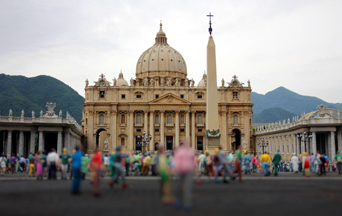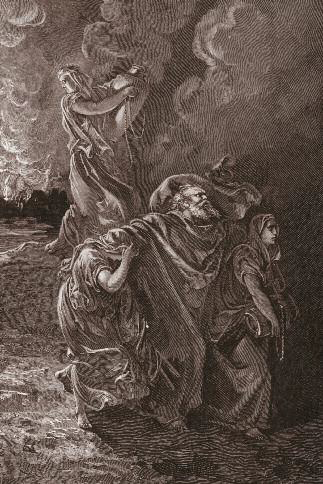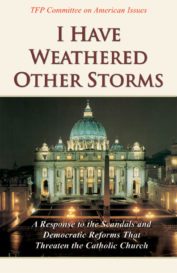
The outrage over both the sexual scandals and the complicity of members of the hierarchy is definitely morally justified. This makes a discussion of the causes all the more necessary.
A Sin That Cries to Heaven for Vengeance
The sin of homosexuality is extremely grave. Consequently, catechisms and other texts used to list it among the sins that “cry to Heaven for vengeance.”1
The Catechism of the Catholic Church promulgated by John Paul II in 1992 reads: “Basing itself on Sacred Scripture, which presents homosexual acts as acts of grave depravity, tradition has always declared that ‘homosexual acts are intrinsically disordered.’”2
10 Razones Por las Cuales el “Matrimonio” Homosexual es Dañino y tiene que Ser Desaprobado
Homosexuality is a sin condemned in the Old Testament,3 by both Saint Peter and Saint Paul in the New Testament,4 by Fathers and Doctors of the Church, and by the Popes for 2,000 years. Saint Peter Damian, a Doctor of the Church, says it “should not be considered an ordinary vice, for it surpasses all of them in enormity.”5
Saint Thomas Aquinas explains that since God made the natural order, violating this order by committing the sin of homosexuality insults the Creator. He quotes from Saint Augustine:
Those foul offenses that are against nature should be everywhere and at all times detested and punished, such as were those of the people of Sodom, which should all nations commit, they should all stand guilty of the same crime, by the law of God which hath not so made men that they should so abuse one another. For even that very intercourse which should be between God and us is violated, when that same nature, of which He is the Author, is polluted by the perversity of lust.6
Eternal and Natural Law: The Foundation of Morals and Law
When a priest or a person consecrated to religious life commits this sin, it becomes a sacrilege.7 When aggravated by child abuse, the Savior’s terrible words apply: “It were better for him that a great millstone should be hanged about his neck, and that he be drowned in the depths of the sea.”8
Sins Against the Faith Are Chastised With Unbridled Sensuality
From a theological standpoint, God chastises those who abandon the Faith with unbridled sensuality.
In his Epistle to the Romans, Saint Paul explains that the pagans, violating the Natural Law written on their hearts, exchanged the true God for idols and were consequently punished:
Therefore, God handed them over to degrading passions. Their females exchanged natural relations for unnatural, and the males likewise gave up natural relations with females and burned with lust for one another. Males did shameful things with males and thus received in their own persons the due penalty for their perversity.9
Learn All About the Prophecies of Our Lady of Good Success About Our Times
The great exegete Cornelius a Lapide (1567-1637) comments on Saint Paul’s teaching:
Monstrous sensuality is a punishment for infidelity, impiety, and heresy. This is so because where faith is absent there is no grace of God, and where the grace of God is absent there can be no chastity but only concupiscence.… Heresy and infidelity are born from pride; and the punishment of pride is sensuality just as the prize for humility is chastity. This is the just order established by God; for if man subjects his mind to God, so will his body be subject as well. On the contrary, when man rebels against Him, so does his body rebel against him too, as Saint Gregory aptly puts it: “Humility guarantees the purity of chastity, for if one’s spirit is piously submissive to God, one’s flesh does not illicitly revolt” (lib. XXVI Moral., XII).10

“The Flight of Lot” from Sodom, by Gustave Doré.
Analyzing Saint Paul’s words in Romans 1:26-27, Jesuit Father Fernand Prat explains that the process of decadence has two phases: “first, the gradual clouding of the mind, and then the perversion of the heart and the obliteration of the moral sense.”11
Science Confirms: Angels Took the House of Our Lady of Nazareth to Loreto
The present crisis shows how far the obliteration of the moral sense has reached in our days, even among the clergy.
The Root of the Scandals: A Crisis of Faith
Consequently, one must look for the most profound causes of the moral scandals shaking the Church in a crisis of Faith.
In his first encyclical, E Supremi, Pope Saint Pius X (1903-1914) alludes to this apostasy, saying:
We were terrified beyond all else by the disastrous state of human society today. For who can fail to see that society is at the present time, more than in any past age, suffering from a terrible and deep-rooted malady which, developing every day and eating into its inmost being, is dragging it to destruction? You understand, Venerable Brethren, what this disease is—apostasy from God.12
Saint Pius X waged a relentless struggle against the modernist heresy that had deeply infiltrated the Church. He pointed out its errors and methods of action in a number of Pontifical documents and took many disciplinary measures.13
This heresy, nevertheless, carried on its insidious action inside the Church. Pius XII launched several important encyclicals against it.14 Paul VI denounced its presence in the Encyclical Ecclesiam Suam, in 1964:
Was not the phenomenon of modernism, for example, which still crops up in the various attempts at expressing what is foreign to the authentic nature of the Catholic religion, an episode of abuse exercised against the faithful and genuine expression of the doctrine and criterion of the Church of Christ by psychological and cultural forces of the profane world?15
Despite all these efforts, the crisis in the Church, and the consequent crisis in society, has worsened.
I Have Weathered Other Storms:
A Response to the Scandals and Democratic Reforms that Threaten the Catholic Church
Prof. Plinio Corrêa de Oliveira observed:
History narrates the innumerable dramas the Church has suffered in the twenty centuries of her existence: oppositions that germinated outside her and tried to destroy her from outside; malignancies that formed within her, were cut off by her, and thereafter ferociously tried to destroy her from outside.
When, however, has history witnessed an attempted demolition of the Church like the present one? No longer undertaken by an adversary, it was termed a self-destruction in a most lofty pronouncement having world-wide repercussion.16
The “self-destruction” Prof. Corrêa de Oliveira refers to is drawn from a famous statement of Paul VI. On December 7, 1968, in an allocution to the students of the Pontifical Lombard Seminary, this Pontiff affirmed: “The Church finds herself in an hour of disquiet, of self-criticism, one might even say of self-destruction.”17
A few years later, in the allocution “Resistite fortes in fide,” the same Pontiff said: “The smoke of Satan has entered into the temple of God through some crack.… An adverse power has intervened. His name is the devil, the mysterious being to which Saint Peter also alludes in his Epistle.”18
In 1981, John Paul II painted the condition of the Church in somber tones:
One must be realistic and acknowledge with a deep and pained sentiment that a great part of today’s Christians feel lost, confused, perplexed, and even disillusioned: ideas contradicting the revealed and unchanging Truth have been spread far and wide; outright heresies in the dogmatic and moral fields have been disseminated, creating doubt, confusion, and rebellion; even the liturgy has been altered. Immersed in intellectual and moral “relativism” and therefore in permissiveness, Christians are tempted by atheism, agnosticism, a vaguely moralistic illuminism, a sociological Christianity, without defined dogmas and without objective morality.19
Joseph Cardinal Ratzinger, Prefect of the Congregation for the Doctrine for the Faith, spoke in a similar fashion:
Developments since the Council seem to be in striking contrast to the expectations of all, beginning with those of John XXIII and Paul VI … What the Popes and the Council Fathers were expecting was a new Catholic unity, and instead one has encountered a dissension which—to use the words of Paul VI—seems to have passed over from self-criticism to self-destruction.20
Reflecting on the crisis of sexual scandals, one must conclude that the punishment of abandonment by God has fallen not only upon civil society but also large sectors of the Church darkened by the “smoke of Satan.”
This article is a chapter of the book, I Have Weathered Other Storms: A Response to the Scandals and Democratic Reforms That Threaten the Catholic Church by the TFP Committee on American Issues.
Footnotes
- “Since the sixteenth century, it has been the custom to apply the term ‘sins that cry to heaven for vengeance’ to certain faults that gravely violate the social order, and which Sacred Scripture expressly says cry to heaven for vengeance, i.e., call down God’s punishment on those who commit them. There are four such sins: homicide (Gen. 4:10); sodomy (Gen. 19:13); oppression of widows and orphans (Exod. 22:22ff.); depriving workers of their just wage (Deut. 24:17ff.; James 5:4).” Dom GregorioManise, O.S.B., “Sins That Cry To Heaven For Vengeance,” in Dictionary of Moral Theology (Westminster, Md.: The Newman Press, 1962), p. 1139. Our emphasis.
- Catechism of the Catholic Church, 2nd ed., #2357.
- Gen. 19:1-29; Lev. 18:22; Deut. 22:5.
- 2 Pet. 2:6-7; Rom. 1:24-27; 1 Cor. 6:10; 1 Tim. 1:10.
- St. Peter Damian, Liber Gomorrhanius (Book of Gomorrah) in Migne, Patrologia Latina, Vol. 145, col. 159-190.
- St. Thomas Aquinas, Summa Theologica, II-II, q.154, a.12.
- “Carnal sacrilege: a carnal act between two people at least one of whom is consecrated to God through the priesthood or through a public vow of chastity.” Marcellinus Zalba, S.J., Theologia Moralis Summa (Madrid: Biblioteca de Autores Cristianos, 1957), Vol. II, p. 153.
- Matt. 18:6; Mark 9:41; Luke 17:2.
- Rom. 1:26-27.
- Cornelii a Lapide, Commentaria in Scripturam Sacram (Paris: Vivès, 1863), Vol. 18, p. 54.
- Fernand Prat, S.J., The Theology of Saint Paul (Westminster, Md.: The Newman Bookshop, 1952), Vol. I, p. 201.
- Pius X, E Supremi, Oct. 4, 1903, no. 2.
- See Denzinger, nos. 2001-2176.
- Mystici Corporis Christi (1943), Mediator Dei (1947), and Humani Generis (1950).
- Paul VI, Ecclesiam Suam, Aug. 6, 1964, no. 26.
- Plinio Corrêa de Oliveira, Revolution and Counter-Revolution (York, Penn.: The American Society for the Defense of Tradition Family and Property, 1993), p. 148.
- Insegnamenti de Paolo VI, Vol. 6, p. 188. Our emphasis.
- Ibid., Vol. 10, pp. 707-709.
- John Paul II, “Allocution to the Religious and Priests Participating in the First Italian National Congress on Missions to the People for the 80s,” L’Osservatore Romano, Feb. 7, 1981. Our emphasis.
- From Vittorio Messori, The Ratzinger Report (San Francisco: Ignatius Press, 1985), p. 29.


